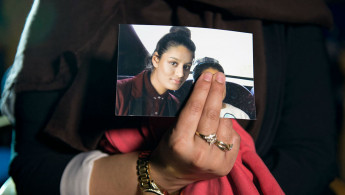Shamima Begum given legal aid to challenge UK government's withdrawal of nationality
Begum emerged in a Syrian refugee camp in February, sharing with the world her wish to return to the UK. Shortly after, the UK Home Office revoked her passport leaving her stateless.
Lawyers representing Begum have successfully asked for legal benefit on her behalf, the Daily Mail revealed on Sunday, helping them in their legal challenge to bring her black to the UK
Begum was allegedly a member of the IS' "morality group", it was revealed on Sunday.
Begum, a 19-year-old who fled her home in East London four years ago with two other school girls to join the extremist group, has claimed she was only a "housewife" during her time in Syria.
Syrian activists have disputed those claims, telling The Sunday Telegraph that Begum had been sighted patrolling the streets of Raqqa, armed with an automatic weapon and scaring the local population.
|
Foreign Secretary Jeremy Hunt said the Legal Aid Agency's decision to assist Ms Begum made him "very uncomfortable", reported the BBC.
He added that the UK was "a country that believes that people with limited means should have access to the resources of the state if they want to challenge the decisions the state has made about them".
Legal aid assists those with limited financial means to meet the costs of legal advice and representation. The Legal Aid Agency, part of the ministry of justice, is responsible for granting the aid funded by tax payers.
Begum's case will be heard before the Special Immigration Appeals Commission, which deals with cases where citizenship is stripped by the home office.
Home Secretary Sajid Javid was criticised over his decisison to revoke Begum's citizenship after her three-week-old baby passed away from pneumoia in March. Begum had lost two other children in Syria.
It is illegal to revoke a person's citizenship if it renders them stateless. The UK government did so on the grounds that Begum had a heritage claim to Bangladeshi citizenship through her mother.
The family of Shamima Begum have said they will challenge the British government's decision to revoke her citizenship.
Begum's family lawyer Tasnime Akunjee travelled to Syria in March in order to gain her signature for a legal plea to regain her British citizenship.
Her signature was needed for an appeal to the Special Immigration Appeals Commission, which has previously found decisions by the UK government to strip people of their citizenship unlawful.
Akunjee was not permitted to enter the al-Hol camp to visit Begum by the Syrian Democratic Forces (SDF) which administers and guards the camp.
Agencies contributed to this report.
Follow us on Twitter: @The_NewArab





 Follow the Middle East's top stories in English at The New Arab on Google News
Follow the Middle East's top stories in English at The New Arab on Google News


